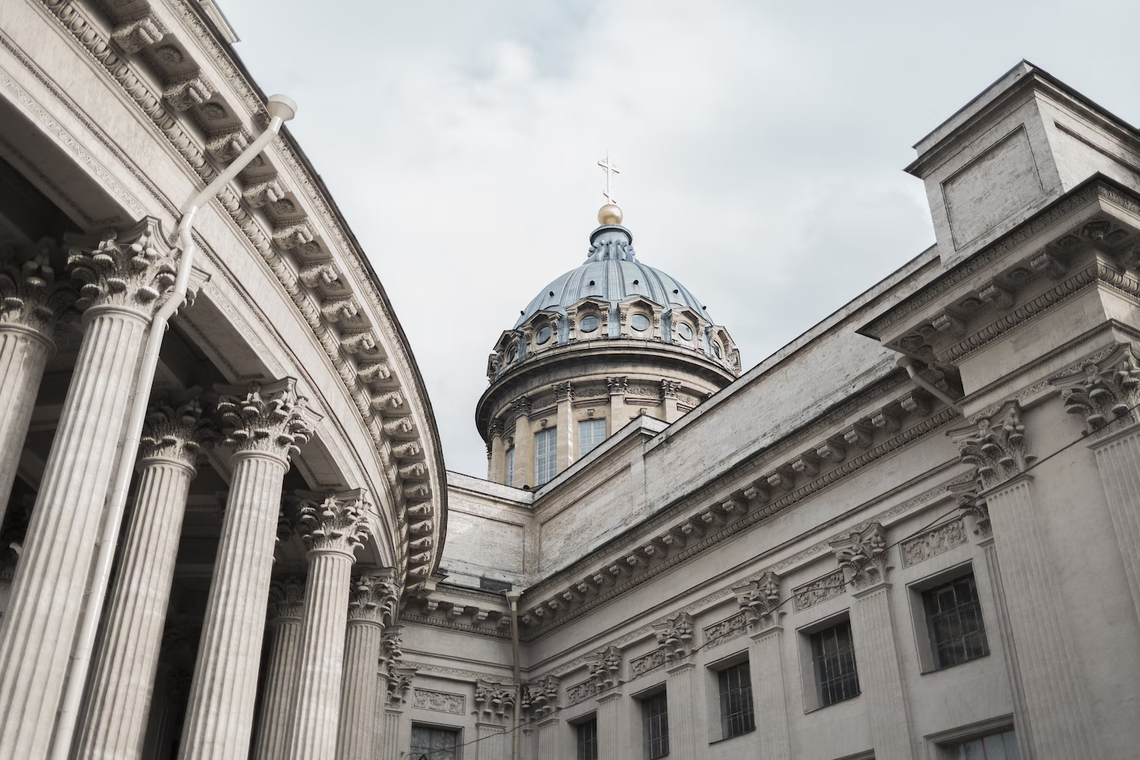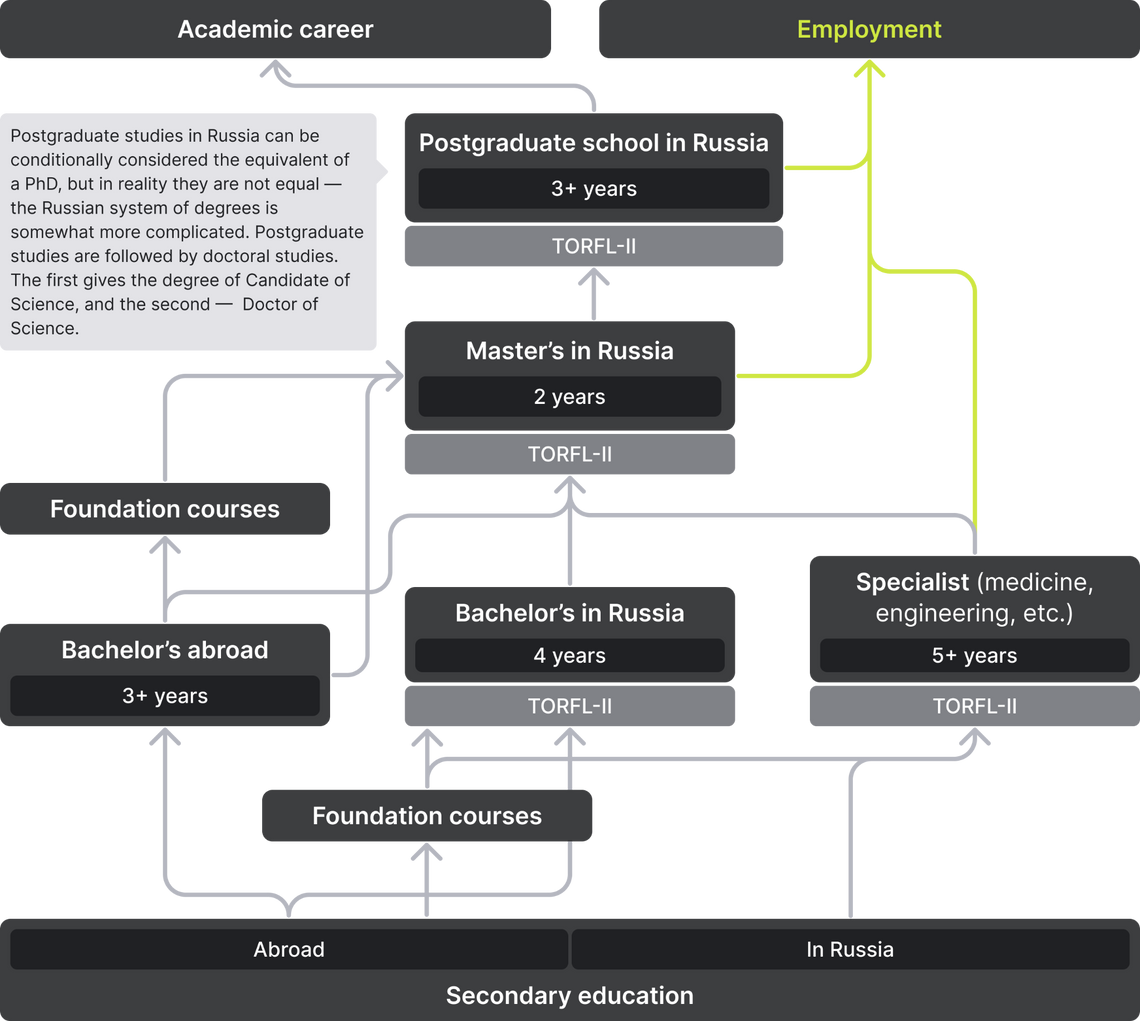
Apply to a foreign university with confidence
- Properly fulfilled documents
- Perfect motivation letter
- Support from a personal mentor
- Offers from several universities
Article score: 4.6 out of 5 (5 reviews)
In this article, we will explain the process of entering Russian universities, how much it costs to study, and what kind of scholarships are available.
Free consultation
Admission to a Russian university is a relatively simple and understandable procedure. Citizens of the country pass the Unified State Examination (USE) in several subjects. For foreigners, the process is similar, but they can pass entrance tests conducted by the university in addition to the USE.
In this article, we will explain the process of entering Russian universities, how much it costs to study, and what kind of scholarships are available.
| Type of study | Age | Duration | Min. cost | Avg. cost |
|---|---|---|---|---|
| Summer camp | 7+ | 2+ weeks | 18 USD/week | 144 USD/week |
| Language courses | 5+ | 1+ weeks | 60 USD/week | 144 USD/course |
| Secondary education | 6+ | 11 years | 4,310 USD/year | 7,183 USD/year |
| College | 16+ | 1-2 years | 42 USD/year | 1,197 USD/year |
| University preparation | 17+ | 1 year | 1,197 USD/year | 1,197 USD/year |
| Bachelor's degree | 18+ | 4 years | 718 USD/year | 2,993 USD/year |
| Master's degree | 20+ | 1-2 years | 1,197 USD /year | 3,113 USD/year |
| MBA | 20+ | 1-2 years | 2,993 USD /year | 4,789 USD/year |
| Postgraduate | 20+ | 3 years | 1,437 USD /year | 2,394 USD/year |
| Expenses | Average cost |
| Unified State Examination | - |
| Student visa | 160 USD |
| Insurance | 72 USD/year |
| Accommodation | 14 USD/month |
| Transportation | 5 USD/month |
| Meals | 120 USD/month |


The admission process to bachelor’s programs for foreigners is a bit more complicated than for Russian citizens. You have three main paths:
Another option to study for free is to participate in university olympiads available to foreigners. Winners have the right to enroll in a university without entrance exams.
Regardless of the path you choose, for admission you will need a:
Everything must be translated into Russian, notarized or approved at the consular department of the embassy[1]. Upon arrival in the country, you will need to provide original documents and a medical certificate confirming that there are no contraindications for studying in Russia.
For admission, foreigners do not need to prove Russian language proficiency, but if an applicant takes the Unified State Examination or entrance examinations, it is assumed that he already speaks Russian and will be able to demonstrate this during testing. Those who follow the government's quota show knowledge of the language during an interview.
If you do not speak Russian well enough, but still want to study in the country, then you should enroll in a preparatory program. During the preparatory year, foreigners study the language and basic subjects in their specialty. Afterwards, they take exams in the disciplines they have passed, including Russian. Such programs cost from 1,200 USD/year to 3,500 USD/year, but if you enter under the quota of the Russian government, you can study for free. Read more about preparatory courses in Russia here.
Everything about the admission process to a Russian university can be found on the university's website or on the Study in Russia website.
Admission to master's and postgraduate programs is carried out:
As in the case of bachelor’s studies, foreigners can study for free at the master’s level. To do so, you must either apply on equal footing with applicants from Russia (participate in the general competition for budgetary placements), or apply for a government scholarship and be enrolled according to the quota. In the first case, you also pass entrance examinations and/or a portfolio competition (for details, look at the website of your university and program). For the second option, you will go through a dual stage competition with an interview.
Documents for admission to a master’s program:
For a postgraduate program, you will additionally need to prepare an abstract or thesis of a research paper, and provide a list of scientific publications.
For master's and postgraduate studies, universities may require a language proficiency certificate in which the program will run, be it Russian, English, German, or French. However, they are more often needed as an element of the portfolio, for which they give points when participating in a competitive selection. Master's and postgraduate students also have access to preparatory programs and Russian language courses, but only for a fee.
To confirm previous foreign education in Russia, it is necessary to go through the procedure of consular legalization or by apostille. You can check what type of legalization is required for your document on the National Information Center portal. After legalization, the document will be recognized by Rosobrnadzor. You can submit documents in person, by mail, through your Personal Account[2] or through the State Services portal. The term for consideration of the application is up to 45 days. The cost is 78 USD[3].
The main package of documents:
Additional documents confirming preparation — on request:
Important:

Scholarships in Russia are divided into the following types:
Foreign students can study in Russia free of charge. There is a federal quota for budgetary placements for foreigners — in 2021 it amounted to 18000 places. The winners do not pay tuition, get free accomodation at a hostel, and receive a monthly stipend of about 24 USD. To get into this quota, you need to apply to the branch of Rossotrudnichestvo or the Russian embassy in your country. There, you can find detailed information about what documents are needed for admission. Usually this is a passport, photograph, completed participant questionnaire, and copy of a document on previous education. After the Russian representative office selects participants who meet the requirements, their list is sent to the Ministry of Education and Science, and from there to the universities themselves.
Academic stipend. All students enrolled in state-funded places receive a monthly academic scholarship during the first semester: from 18 USD up to 84 USD per month, depending on the university. From the second semester, payments are assigned based on performance — they are issued only to those who passed the session with "good" and "excellent" grades. But even if students lose their scholarship for a semester (in case of satisfactory grades), they still continue to study for free. In addition, universities can assign an increased academic scholarship for academic excellence and special achievements, which reaches 180 USD.
The social stipend is intended for vulnerable groups of the population, such as orphans, the disabled, and veterans. It does not depend on academic success and is at least 27 USD. However, universities have the right to increase the size of the payment: at the Omsk State Pedagogical University, such students receive an additional 60 USD once a semester[4], and at the Moscow Institute of Physics and Technology — 14 USD/month[5].
Especially talented students can count on presidential, government, and private scholarships. These additional payments are received by students of the third year and onwards — winners of olympiads, creative competitions, and authors of discoveries and scientific articles. The amount of the scholarship is from 17 USD to 84 USD for bachelor’s students and from 54 USD to 120 USD for graduate students. The exact amount of the payment depends on the source of the scholarship (president or government), personal accomplishments, and whether or not the program of study is prioritized in the country. Moreover, young scientists and graduate students can receive 273 USD/month if they are engaged in advanced research. Candidates are nominated by faculty scholarship committees, meaning that the student himself does not need to apply directly.
There are also private scholarship programs in Russia. For example, RANEPA in cooperation with the British company BP pays 180 USD, 239 USD or 419 USD per month to undergraduate, graduate, and postgraduate students, respectively. Gazprombank supports secondary vocational education — every year the best college students participate in company competitions and win scholarships. Lastly, the foundation of entrepreneur Vladimir Potanin pays a scholarship of 180 USD to the best master's students at 75 Russian universities. The conditions for receiving any private scholarship are determined by the organization that pays it out. To find out which scholarships you can apply for, contact the student department of your university.
Private scholarships in Russia:
To study in Russia, citizens of other countries need to obtain a student visa. Often, this rule is valid even for countries with which bilateral visa-free agreements have been concluded. Typically, such agreements provide only tourist trips lasting 1-3 months per year, rather than permanent residence.
A complete list of countries whose citizens can study in Russia without a student visa:
Everyone else needs to receive an official invitation from the university. It is issued 30-45 days after enrollment. Within 90 days after that, the student must apply for a visa at the Russian consulate or embassy. The process of registration takes 2-3 weeks. The student must enter Russia no later than 30 days before the end of this period. Upon arrival in the country, the university helps the foreign applicant to register and apply for a multiple-entry student visa. The processing time is 25 calendar days, during which the entry visa must be valid.
60+ countries
we work with
$1,000,000 saved
by students through scholarships
6,400 offers
our students got